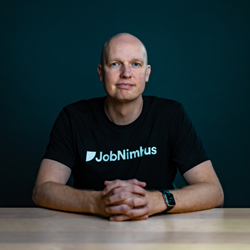Entrepreneur Case Studies
Bootstrap First, Raise Money Later: Ben Hodson, CEO of JobNimbus (Part 1)

Ben is a serial entrepreneur with a long experience in bootstrapping and fundraising. Read on to see how he has navigated his journey.
Sramana Mitra: Let’s start at the very beginning of your journey. Where are you from? Where were you born and raised? What kind of background did you have?
>>>Navigating Multiple Product Pivots: Jebbit CEO Tom Coburn (Part 1)

Tom discusses a very important aspect of building a product company: pivots.
Sramana Mitra: Let’s start at the very beginning of your journey. Where are you from? Where were you born, raised, and in what kind of background?
Tom Coburn: I was born in a suburb outside of Boston, Massachusetts. It’s where the Boston Marathon starts. I grew up there and lived there all my life. I went to high school there at a local public high school. I ended up going to Boston College. I went there to study Biology and become a doctor. I ended up dropping out. I’d also picked up Theology as a double major. I was studying science and religion and ended up doing a marketing technology and data company instead.
>>>Building HubSpot to a Unicorn: Dharmesh Shah’s Amazing Entrepreneurial Journey (Part 6)
Sramana Mitra: How many years did it take you through the $500 million to the IPO?
Dharmesh Shah: A little over seven years.
Sramana Mitra: This is basically what VC’s are looking for – to go from zero to $100 million in five to seven years. Not every entrepreneur has a venture that is amenable to that kind of timeline. This is hypergrowth. Hypergrowth is not a natural state of business. It’s rare and unique. If you don’t have a company that is going to go through hypergrowth, so what? Don’t get stuck on being venture capital friendly on your first venture, especially if you’re a first-time entrepreneur.
>>>Building HubSpot to a Unicorn: Dharmesh Shah’s Amazing Entrepreneurial Journey (Part 5)
Sramana Mitra: It’s not a bad thing to have a tough time raising Series A. Most likely, you’re doing something new. The market is not crawling with 27 other competitors. The problem with that 27 competitors trying to raise money for the same idea is that it’s very noisy. A noisy market is very difficult to penetrate.
Dharmesh Shah: And very expensive.
Sramana Mitra: What are the highlights of the HubSpot journey that you want to underscore and discuss?
>>>Building HubSpot to a Unicorn: Dharmesh Shah’s Amazing Entrepreneurial Journey (Part 4)
Sramana Mitra: One question that comes to my mind is how many of those existing tools were you able to bring into your product design in version one?
Dharmesh Shah: We did it from scratch. Our thinking was that we could have tried taking WordPress and Google Analytics and integrate them into this larger platform, but we wouldn’t be able to control the user experience in the way we needed. You have to control the boundaries and control the user experience in order to make it easy enough. We created everything.
>>>Building HubSpot to a Unicorn: Dharmesh Shah’s Amazing Entrepreneurial Journey (Part 3)
Sramana Mitra: Let’s go to your third chapter. What was the genesis of HubSpot? What was going on in the industry and in your life that led to HubSpot?
Dharmesh Shah: HubSpot was not supposed to happen. When I sold my first company, I promised my wife that I’m not going to do startups anymore. My plan was to get my Ph.D. and teach. While in grad school, I met my Co-Founder Brian Halligan, and we both had a shared passion for SMBs. We both came from tech. He came from a sales and marketing background. I came from product and engineering.
>>>Building HubSpot to a Unicorn: Dharmesh Shah’s Amazing Entrepreneurial Journey (Part 2)
Sramana Mitra: Were you going to grad school with some money?
Dharmesh Shah: The acquisition price was around $15 million. One thing I stumbled about money is that the first $4 or $5 million is life-changing. During undergrad, I was working full-time the whole way through. It took me seven years for what should ideally be a four-year degree.
When I went to grad school, I made the deliberate decision that I was going to be a real student. I didn’t have to work. I always had this aspiration for MIT. It’s why I moved to the Boston area. I moved to Boston in 1999 and didn’t apply at MIT until five years later when I was able to sell my prior company.
>>>Building HubSpot to a Unicorn: Dharmesh Shah’s Amazing Entrepreneurial Journey (Part 1)

Dharmesh discussed his entrepreneurial journey with candor, humility, and generosity. Wonderful conversation.
If you haven’t already, please study our free Bootstrapping course and the Investor Introductions page.
Sramana Mitra: We will start at the very beginning of your journey. Where did you grow up? What kind of upbringing and what kind of circumstances were you raised in? I know you come from a part of India that is particularly entrepreneurial.
>>>